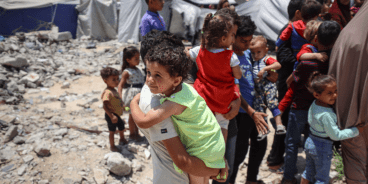Atrocity Alert No. 121: Nicaragua, Myanmar (Burma) and Central African Republic
Atrocity Alert is a weekly publication by the Global Centre for the Responsibility to Protect highlighting situations where populations are at risk of, or are enduring, mass atrocity crimes.
Protests, killings and systematic human rights violations in Nicaragua
On Wednesday, 29 August, the UN High Commissioner for Human Rights published a report regarding ongoing political violence in Nicaragua following months of anti-government protests. The report describes widespread and systematic human rights violations that may amount to crimes against humanity, including disproportionate use of force and extrajudicial killings committed by the police, as well as enforced disappearances, arbitrary detention and torture.
Since April more than 300 people have been killed and 2,000 injured in protests that began in opposition to pension cuts. According to the UN report, in violently suppressing these protests the Nicaraguan government has systematically violated the right to freedom of opinion and expression, as well as the right to peaceful assembly. Nicaraguan police have consistently responded to demonstrations across the country with disproportionate and deadly force.
Over the following four months state security forces and pro-government paramilitaries have also systematically persecuted anti-government activists, causing at least 23,000 people to flee to neighboring Costa Rica. Meanwhile the fate of hundreds of Nicaraguans held in arbitrary detention remains uncertain.
The government, under the leadership of President Daniel Ortega, has denied responsibility for the violence and appears unwilling to peacefully resolve the political crisis. The government expelled the UN team from the country after the release of their report. The UN Security Council held its first briefing on the crisis in Nicaragua today.
In cooperation with the Organization of American States and other bodies, the government must take tangible steps to deescalate tensions and mitigate the growing risk of potential crimes against humanity in Nicaragua. The government should immediately demobilize and disarm pro-government paramilitaries, and ensure that its treatment of political detainees complies with international law. All civilian deaths should be independently investigated and those responsible must be held accountable, regardless of their position or affiliation.
Myanmar journalists jailed for exposing military’s atrocities
On Monday, 3 September, two Reuters journalists were sentenced to seven years in prison after being found guilty of violating Myanmar’s Official Secrets Act. At the time of their arrest in December 2017 the reporters – Wa Lone and Kyaw Soe Oo – were investigating a massacre of Rohingya villagers by Myanmar’s security forces in the northern Rakhine hamlet of Inn Din. Monday’s verdict is widely considered a case of politically motivated retaliation against the journalists for exposing atrocities committed by Myanmar’s military.
The court decision was met with condemnation from human rights advocates and government officials around the world. UN Secretary-General António Guterres said it was “unacceptable that these journalists were prosecuted for reporting on major human rights violations against the Rohingya in Rakhine State” and called on Myanmar’s authorities to urgently review the decision.
The sentencing comes a week after the UN-mandated Independent International Fact-Finding Mission (FFM) called for Myanmar’s top military officials to be prosecuted for committing genocide against the Rohingya, as well as for crimes against humanity and war crimes perpetrated in Kachin, Rakhine and Shan states.
In response to the FFM and mounting evidence of genocide, the UN Security Council, regional organizations and individual governments should immediately impose targeted sanctions on all senior military officers with command responsibility for mass atrocity crimes in Rakhine State, including Commander-in-Chief General Min Aung Hlaing. The Security Council should also refer the situation in Myanmar to the International Criminal Court.
State Counsellor Aung San Suu Kyi, Myanmar’s de facto head of government and a former political prisoner, should issue a pardon to Wa Lone and Kyaw Soe Oo and immediately release the two journalists from prison.
No amnesty for atrocities in Central African Republic
Representatives from 14 armed groups have met in Bouar, western Central African Republic (CAR), for preliminary talks aimed at ending endemic armed conflict in the country. The meeting, which ended on 30 August, was supported by the African Union (AU). A declaration of understanding was also signed between rival armed groups last week in a separate political dialogue hosted by Russia and Sudan.
Although seven major political agreements have been signed in CAR since 2012, none has resulted in a sustainable peace process and widespread violations of International Humanitarian Law continue to be documented across the country. Both ex-Séléka rebels and so-called anti-Balaka armed groups continue to commit potential war crimes and crimes against humanity.
The majority of armed groups that participated in the AU-mediated dialogue requested a possible amnesty for their members. Such an amnesty would potentially include those who have been perpetrators of mass atrocity crimes, including targeted killings of civilians on the basis of their ethnic or religious identity, as well as recruitment of child soldiers, sexual slavery and torture.
Although a political dialogue with various armed groups is essential for building a sustainable peace in CAR, accountability for mass atrocity crimes should remain non-negotiable. The government should continue to support efforts by the Special Criminal Court and the national judiciary to investigate and prosecute perpetrators of atrocities, and end the cycle of impunity in CAR.
Read Next
Related Publications

Atrocity Alert No. 443: Sudan, Israel and the Occupied Palestinian Territory and United States Travel Ban

